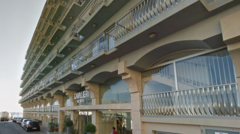Indonesian law enforcement has successfully dismantled a baby trafficking operation allegedly responsible for selling at least 25 infants to Singapore since 2023, arresting 13 individuals and rescuing six infants. Police are actively pursuing buyers and aim to address the root causes of child trafficking in the region.**
Indonesian Police Disrupt Major Baby Trafficking Network with Arrests and Rescues**

Indonesian Police Disrupt Major Baby Trafficking Network with Arrests and Rescues**
Authorities emphasize urgency in locating buyers as a trafficking ring is exposed, selling infants for thousands of dollars.**
Indonesian police have made significant progress in dismantling an international baby trafficking network, reportedly selling at least 25 infants to buyers in Singapore since early 2023. Following a recent operation, authorities arrested 13 suspects in the cities of Pontianak and Tangerang, successfully rescuing six babies who were on the verge of being trafficked. These infants, estimated to be around a year old, were initially housed in Pontianak where their immigration paperwork was prepared prior to their shipment to Singapore.
The West Java Police's director of general criminal investigation, Surawan, revealed to BBC News Indonesia that the syndicate's operations often targeted parents or expectant mothers seeking to give up their children. In some instances, they established contact through social media platforms like Facebook before transitioning to private messaging apps like WhatsApp. Surawan highlighted the alarming practice of accepting reservations for babies still in the womb, stating, “Once born, the delivery costs were covered, then compensation money was given, and the baby was taken."
The criminal network appeared to involve various roles, including recruiters sourcing infants intended for sale, caregivers managing the infants, and individuals falsifying official documents like birth certificates and passports. After being removed from their biological mothers, the babies were allegedly cared for by appointed guardians for up to three months before being relocated to Jakarta and subsequently back to Pontianak for documentation.
Investigators revealed that the infants were sold for prices ranging from 11 million to 16 million Indonesian rupiahs (approximately $673 to $1,015), with a ratio of male to female babies sold showing notable demand. According to reports from the apprehended suspects, they have sold a total of 12 male and 13 female infants, primarily originating from various locales in West Java.
West Java police have indicated that their "immediate task" involves tracing the buyers in Singapore. Surawan reassured the media that a thorough investigation is ongoing to match the infants’ deployment data with the records of those who traveled, ensuring they identify all adopters involved.
Crucially, these operations are compounded by the harsh economic realities faced by many parents, with some indicating that they agreed to sell their children due to financial difficulties. Surawan warned that these parents could potentially face criminal charges themselves if evidence of complicity or agreement with the traffickers is established.
To further their investigation, Indonesian police have enlisted the aid of Interpol and authorities in Singapore to locate members of the syndicate still at large, alongside the buyers, stating, “We will list the perpetrators as wanted persons and may issue a red notice requesting their arrest."
According to Ai Rahmayanti, a commissioner from the Indonesian Child Protection Commission, traffickers often seek vulnerable women, including those who have experienced sexual violence or unexpected pregnancies. In Indonesia, abortion remains illegal except under specific circumstances, leaving some women trapped in difficult situations where they feel compelled to give up their children.
Ai Rahmayanti pointed out that organizations posing as maternity clinics or social shelters often exploit these vulnerabilities, presenting a façade of care while facilitating illegal adoptions. There is, however, an alarming trend of increasing cases related to child trafficking and illegal adoptions. In 2023, the KPAI recorded a figure significantly rising from 11 cases in 2020 to 59 cases this year, highlighting a growing epidemic of child exploitation.
While the prices for trafficked babies vary by region, reports suggest that they can range anywhere from Rp11 million to Rp26 million, based on factors including the child’s physical appearance, which further underscores the severity of this grim reality in Indonesia.



















